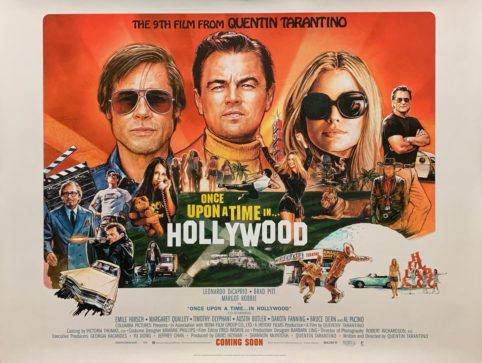Watching the latest installment of “The Matrix”, I was reminded of my love/hate relationship with Science Fiction. I wouldn’t count myself as a huge SF fan, but I dip my toe in from time to time, and occasionally find a sub-genre, eco-system or franchise that draws me in deeper, whether via television, film or literature. Unfortunately, while the original “Matrix” movie (and maybe the first sequel) managed to be original, entertaining and engaging, by the time of “The Matrix Revolutions” both the plot and the characterisation had run thin. When I saw the trailers and the pre-launch campaign for “The Matrix Resurrections”, I was sufficiently intrigued to want to see it, especially in light of recent geo-political events. Sadly, it was a huge waste of time: the plot was banal, and the story-line disjointed; there were awkward flashbacks to the previous films (in large part to remind us of the actors who originally played the current characters?); and there were far too many retrospective explanations to justify the present “narrative”. The whole thing felt like another Keanu Reeves character had stumbled into a dystopian Lewis Carroll landscape – “Wick in Wonderland” would have been a more suitable title.

“The Terminal Man” by Michael Crichton (image sourced from the author’s website)
Growing up in the UK in the 1960s, my school friends and I avidly watched a bunch of TV programmes that found a young and eager audience for SF. These productions also spawned multiple re-boots, spin-offs and imitators, as well as giving rise to the franchise phenomenon that dominates much of today’s cinema. Those early shows included “Star Trek”, “Lost in Space”, “Planet of the Apes” and “Land of the Giants”. All of these programmes were American, which I suppose made them seem even more exotic, and therefore more appealing, to our impressionable minds.
By contrast, British television had produced the “Quatermass” TV series back in the 1950s, and “Dr Who” (launched in 1963), both of which pre-dated their US counterparts by several years. But in my mind these domestic efforts were firmly rooted in Gothic horror – more H.G.Wells and Jules Verne than Isaac Asimov and Philip K. Dick? – and therefore they felt less futuristic, especially when we were witnessing the real-life events of the Space Race on the evening news. Which is probably why even Gerry Anderson’s puppet creations such as “Fireball XL5”, “Thunderbirds” and “Captain Scarlet” resonated with me more than Daleks and Cybermen. So to me, British television was more successful in producing psycho-dramas founded upon stories of espionage set against backdrop of the Cold War, with programmes such as “Danger Man”, “The Avengers”, “The Champions” and “The Prisoner” being far more evocative of contemporary themes and fashions, notwithstanding some creaky plot lines.
Later, I would watch classic SF films of the 1950s, such as “The Day the Earth Stood Still”, “The Blob” and “Forbidden Planet” which, despite their technical limitations, are still key reference points for fans of the genre; they also convey elements of Cold War paranoia, and the perennial fear of “the other”. Then, as a young teenager, I found myself reading SF novels, including works by Asimov, John Wyndham, Aldous Huxley, Michael Crichton, Norman Spinrad, Brian Aldiss and J.G.Ballard. Ballard, of course, preferred to explore “inner space” rather than outer space, and this means his writing contains universal themes that are not constrained by contemporary accounts of futuristic technology. In fact, this theme of “inner space” probably underpins my preferences within the SF genre, as evidenced by 1960s movies I managed to see when I was older, such as “Seconds”, “Alphaville”, and “Fahrenheit 451”.
Despite an aversion for SF that is over-reliant upon technology as a plot technique, I have enjoyed some recent novels that engage with emerging technology such as AI and robotics – great examples would include William Gibson’s “Agency”, Ian McEwan’s “Machines Like Me”, and Jeanette Winterson’s “Frankissstein”.
However, if I was to delineate my personal likes/dislikes of SF in film and on TV, I would probably list them as follows:
- As a child, I loved the original “Star Trek”, but I’ve never seen a “Star Trek” film or any of the newer TV series
- I’ve never seen a “Star Wars” film, and have no desire to
- “Moon” was great, and “Source Code” wasn’t bad either
- I really enjoyed “Close Encounters of the Third Kind”, and I appreciated “Contact”, “Arrival”, “Interstellar” and “The Martian”
- “Gravity” was somehow plausible, whereas “Elysium” was a stretch
- “2001: A Space Odyssey” is in a class of its own
- Same with “The Man Who Fell To Earth”
- I loved the first four “Alien” movies, but I disliked the so-called prequels, and I’ve avoided the “Predator” cross-overs
- The original “Terminator” film was great, but the sequels prove the law of diminishing returns
- I really enjoyed “Looper” and in a somewhat similar vein, “Inception”
- I couldn’t ever get into the “X-files” – but I was hooked on “Twin Peaks”
- The original “Westworld” movie was fine, but I have no interest in the recent TV series
- Similarly, I love the original film versions of “Blade Runner” and “Total Recall”, but see no point in the later remakes
- And while I used to watch re-runs of the original “Twilight Zone” series, I’ve not seen the later re-boot; however, “Black Mirror” got my attention
- “Donnie Darko” yes, “Stranger Things” no
- Overall, I tend to avoid SF that is more firmly rooted in the sub-genres of horror, fantasy, magic, super heroes (with super powers), space westerns, superstition, disaster themes and most tales of the supernatural (and anything with Kevin Costner….)
Finally, there is room for humour in SF, if done well – such as “Dark Star”, “Mars Attacks!”, and “Tremors”; even the first “Men in Black” effort is head and shoulders above “Wild Wild West”….
Next week: Smart Contracts… or Dumb Software


